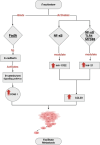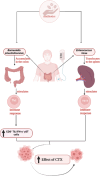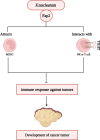The bacterial microbiome and cancer: development, diagnosis, treatment, and future directions
- PMID: 39607612
- PMCID: PMC11604675
- DOI: 10.1007/s10238-024-01523-9
The bacterial microbiome and cancer: development, diagnosis, treatment, and future directions
Abstract
The term "microbiome" refers to the collection of bacterial species that reside in the human body's tissues. Sometimes, it is used to refer to all microbial entities (bacteria, viruses, fungi, and others) which colonize the human body. It is now generally acknowledged that the microbiome plays a critical role in the host's physiological processes and general well-being. Changes in the structure and/or function of the microbiome (dysbiosis) are linked to the development of many diseases including cancer. The claim that because of their negatively charged membrane, cancer cells are more vulnerable to some bacteria than normal cells and that is how the link between these bacteria and cancer evolved has been refuted. Furthermore, the relationship between the microbiome and cancer is more evident in the emerging field of cancer immunotherapy. In this narrative review, we detailed the correlation between the presence/absence of specific bacterial species and the development, diagnosis, prognosis, and treatment of some types of cancer including colorectal, lung, breast, and prostate cancer. In addition, we discussed the mechanisms of microbiome-cancer interactions including genotoxin production, the role of free radicals, modification of signaling pathways in host cells, immune modulation, and modulation of drug metabolism by microbiome. Future directions and clinical application of microbiome in the early detection, prognosis, and treatment of cancer emphasizing on the role of fecal transplantation, probiotics, prebiotics, and microbiome biomarkers were also considered.
Keywords: Dysbiosis; Fecal transplantation; Genotoxin; Immune modulation; Inflammation; Oxidative stress; Prebiotics; Probiotics.
© 2024. The Author(s).
Conflict of interest statement
Declarations. Conflict of interest: The authors declare no competing interests. Ethical approval: Not applicable.
Figures





References
-
- Pereira-Marques J, Ferreira RM, Pinto-Ribeiro I, Figueiredo C. Helicobacter pylori infection, the gastric microbiome and gastric cancer. Helicobacter pylori Hum Dis Adv Microbiol Infect Dis Public Health Vol. 2019. 10.1007/5584_2019_366. - PubMed
Publication types
MeSH terms
LinkOut - more resources
Full Text Sources
Medical

